Poetic Realization through Death in Jean Cocteau’s Orphée and Dante’s The Divine Comedy
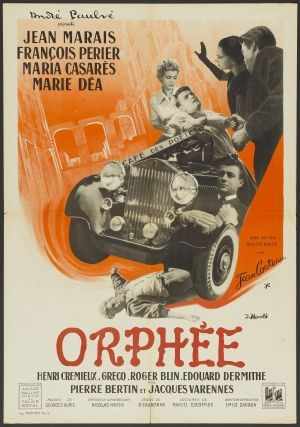
A poet is not only a writer who composes lines with deeper meaning than what appear on the surface; a poet is an individual possessed with the gift of creation. This creation brings them closer to poetic realization and the ability to transcend death through their works. Jean Cocteau was one such poet; he was a director, actor, screenwriter, dramatist. It seemed that there was nothing he could not do. Considered his greatest work, Orphée (1950) is a masterpiece of movie magic. But beneath the surface of cinema, Cocteau creates a film which contains a deeper and more intimate representation of the poet and the poetic journey through death. As a pilgrim-like protagonist, Orpheus, played by Jean Marais, wanders between the underworld and the living world at the middle of his life. Similarly, Dante journeys through a shadowed forest at the middle of his life, having lost the straightforward path, and finds himself traveling closer to his death. As Dante journeys toward the underworld, he becomes strangely elevated by his experience and is able to achieve poetic realization. Both Orpheus and Dante venture to the underworld, and on the way they begin to view life as a kind of death to their poetic potential. Through death, Orpheus and Dante reach poetic realization.
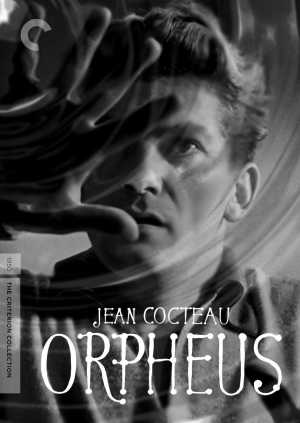
Cocteau’s film Orphée follows the journey of Orpheus, the successful, well respected poet. Cegeste, a young poet, is injured in a fist fight. Following the brawl, Orpheus is beckoned to follow the Princess, the mysterious benefactor of Cegeste, as a witness. Orpheus soon discovers that Cegeste is dead; however, he does not feel overcome by fear, but intrigue. While on the journey to the Princess’ destination, poems filter through the radio in Jean Cocteau’s voice. Orpheus is desperate to find inspiration, forgoing all fear. He remains with the Princess even though he could have easily chosen to leave her and avoided this strange occurrence. Orpheus knows after this moment that his life will never be the same.
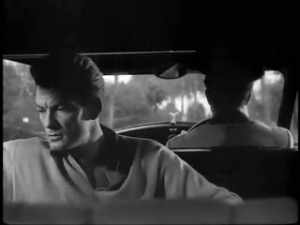
Orpheus begins to feel his intrigue compelling him to abandon his home. The Princess refuses to answer Orpheus’s questioning, continuing to insist that he is dreaming and must accept his dream. As she seats herself at the vanity, and regarding herself in the mirror, Orpheus gazes into the reflection. The radio says “The mirrors will do well to reflect further.” As the Princess and Orpheus gaze at one another through this mirror, it shatters. The shattering of the mirror can only mean that it is indeed reflecting further, into the secret yearnings of Orpheus and the Princess. They both desire an alternative to their uncertain existence.
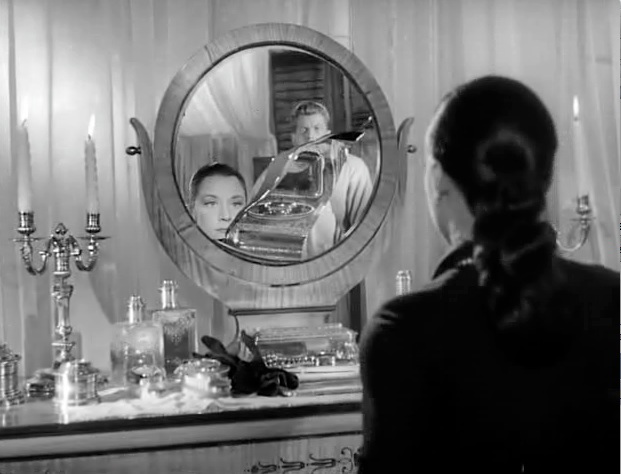
Like Narcissus, they gaze into the mirror and see something deeper, beyond appearance. The mirror becomes a foreboding sign that their desires will lead them on an uncertain path. Like Narcissus, Orpheus the poet begins to fall in love with his own death. For a fleeting moment Orpheus thinks of his world back home, and that he must be missed. He says “’But they expect me back home’” to which Death replies with a snide comment, “’Let your wife wait. She’ll be all the more pleased when you return.’” The Princess, whom Orpheus later learns is his death, is beginning to make an important distinction between their worlds. Life is a place in which the poet, Orpheus, seldom finds the inspiration that will enable him to perceive immortality. Only through death can the poet create poems that will truly define him as transcending death.
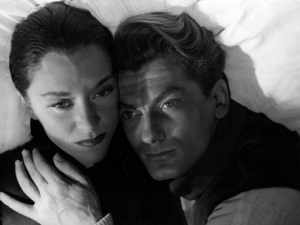 Here, Cocteau uses the “longing and subjection as the represented content of a creative act that transcends materiality” (Desilets 289). The longing for poetic realization becomes something that dominates life, and transcends the material world. Orpheus is conflicted between the desire to create and his desires for his wife Eurydice. As the film progresses, he comes to realize that his home subjects him to a reality that he cannot excel poetically, a reality that forces him to conform and created boundaries, when the whole philosophy behind being a poet is breaking free of boundaries to achieve poetic realization. Thus, Orpheus’ tendency to leave Eurydice, his true wife, is an “allegory of the exceptional state of passionate privation that poets enter when they work” (Desilets 288). His susceptibility to abandon Eurydice becomes the allegory for the conflict a poet feels when working. The desire to give in to the seduction of death, or return to the material world and his wife, are two opposing forces the poet must contend with in order to reach poetic realization.
Here, Cocteau uses the “longing and subjection as the represented content of a creative act that transcends materiality” (Desilets 289). The longing for poetic realization becomes something that dominates life, and transcends the material world. Orpheus is conflicted between the desire to create and his desires for his wife Eurydice. As the film progresses, he comes to realize that his home subjects him to a reality that he cannot excel poetically, a reality that forces him to conform and created boundaries, when the whole philosophy behind being a poet is breaking free of boundaries to achieve poetic realization. Thus, Orpheus’ tendency to leave Eurydice, his true wife, is an “allegory of the exceptional state of passionate privation that poets enter when they work” (Desilets 288). His susceptibility to abandon Eurydice becomes the allegory for the conflict a poet feels when working. The desire to give in to the seduction of death, or return to the material world and his wife, are two opposing forces the poet must contend with in order to reach poetic realization.
The prospect of finding poetic realization through death is a connection that can be directly drawn between Cocteau’s Orphée and Dante. The Divine Comedy was an epic poem written in the 14th century by Dante Alighieri, a poet and participant in Florentine politics. After siding with the White Guelphs, the political party that supported secular power over that of the Pope, he was excommunicated and exiled, and left to wander far from his homeland and family. In The Divine Comedy, Dante finds himself lost in the middle of his life, and as he walks through a dark forest, he realizes that he is lost and headed to Hell. Feeling oppressed by the darkness of his journey, Dante searches for the light that will lead him to salvation. As he comes across the light, he begins to reflect on the journey he has taken thus far:
But when I’d reached the bottom of a hill–
it rose along the boundary of the valley
that had harassed my heart with so much fear–
I looked on high and saw its shoulders clothed
already by the rays of that same planet
which serves to lead men straight along all roads.
At this my fear was somewhat quieted;
for through the night of sorrow I had spent,
the lake within my heart felt terror present.
And just as he who, with exhausted breath,
having escaped from sea to shore, turns back
to watch the dangerous waters he has quit,
so did my spirit, still a fugitive,
turn back to look intently at the pass
that never has let any man survive.
(Canto I 13-27)
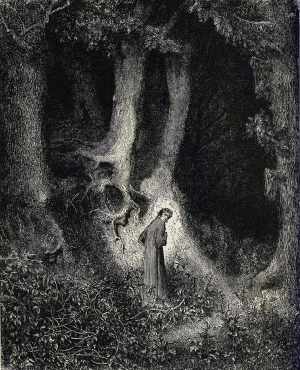
Dante is moved by the breathtaking vision of the “shoulders” of the hill “clothed” by the rays of the sun, who leads men onto the straight path. He has now found himself drawn to the light of the enlightenment and the hope of escaping the forest that brought him terrible fear. Sunlight lifts gloriously above the valley and elevates his spirit, quieting his fear for a moment. But the poem changes after these first few lines, from ecstatic marveling at the light, to a sudden shift to turning back to gaze into the forest that frightens him. After this shift in tone, Dante compares himself to one who has swam from sea to shore, escaping the watery wrath, and turns back to see how far he has come. Dante looks back; but he is not simply reflecting upon the journey. His spirit looks back, an allegory for the difficulty the poet experiences deciding between the soul and the body. Fear compels his body to seek immediate salvation in order to be spared from pain. But the soul, his spirit, desires to look back into the frightening pass. Dante is recognizing that his spirit is “still a fugitive” to the dangerous journey he has taken. Dante’s spirit wants to return to the journey through death.
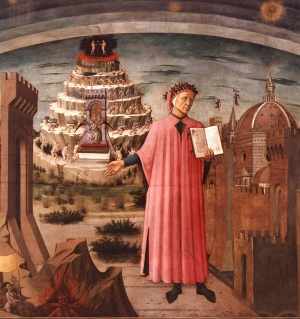
Dante wrote this poem when he had been exiled from his home and excommunicated by the current Pope. He chose to write this poem as taking place a few years before his exile. By writing from the exterior perspective, Dante is reflecting about himself and his own feelings at the time. One can imagine the heartbreak and isolation Dante must have felt after being exiled from his native Florence. Thus, “the Divine Comedy is in part a poem about its own writing—a poem about the poet’s struggle to recognize and to fulfill his poetic potential” (Hatcher 353). He is in a moment of his life where his spirit is fugitive to darkness and self-hatred. But Dante begins to see that his journey may possess the key to his poetic perfection, because the poet is thought as a creator who can only reach their full potential through suffering. Only when the poet can transcend suffering do they become genius.
As the mirror scene in Orphée implied an unholy union between death and the poet Orpheus, so does Dante perceive his own death within the darkness of the path he has taken and becomes a fugitive to death. The deeper Dante journeys “his understanding of sin increases, his sense of justice sharpens, while his poetic language, accordingly, becomes more deliciously descriptive…” (Kleinhenz 49-50). Every aspect of Dante’s poetic genius increases as he continues onward. He achieves a deeper understanding of sin, his sense of justice is reinforced by what he sees and hears from the shades, and his poetry becomes “deliciously descriptive” the further he ventures. Therefore, it can only be said that his poetic journey from darkness to light is what gives him the realization of his poetic genius, and enables him to transcend life. Similarly, it can be argued that through Orpheus, Cocteau is expressing a desire for immortality as Dante.
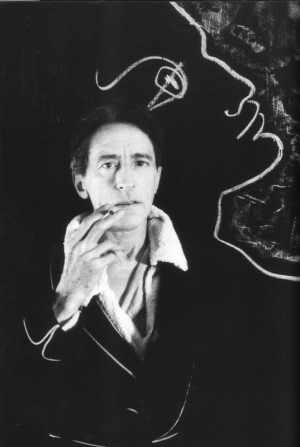
Cocteau once said, “I’ve always preferred mythology to history. Because history is made up of truths which eventually turn into lies. Mythology is made up of lies that eventually become truths. And if I have the luck of living on in your mind, it would be in mythological form (Jean Cocteau, 1962). Throughout his life, Cocteau continued to imagine himself as one day reaching mythological form. The desire Cocteau has to possess eternal life is reflected in Orpheus. He continues to desire death, and Orpheus can only access her through the poetic phrases he hears on the radio, read in Cocteau’s voice.
In Orphée, we can see how he is conveying this desire for immortality and reaching the metaphysical through the uncontrollable urge Orpheus has to listen and record the transmissions from the radio. Heurtebise (the ghostly chauffeur who evokes Dante’s Virgil) and Eurydice, attempt to reason with him, but Orpheus is far too determined to obtain every single verse for himself. Orpheus comes to a profound realization: “My life had begun to pass its peak. It was rotting, stinking of success and death. The least of these phrases is much more than any of my poems. I’d give all I’ve written for even one of those little phrases. I’m on the trail of the unknown.” Orpheus is in the middle of his life, he feels as though he has peaked, and yearns for inspiration. He feels as though these phrases are meant to inspire him alone, filling his stinking, death-like existence with the life of immortality and poetic beauty.
Eurydice speaks as the voice of reason and the unintentional prophet, saying, “I could die and you wouldn’t even notice.” And Orpheus says “We were dead and didn’t notice.” He now views his life before, the absence of perfect poetry, the lack of perfection, as being lifeless and full of death. The irony is that the poetic idea of perfection can only occur when drifting into the unknown, when one is closer to death. Just as Dante has said as he looked back upon his journey through the dark wood. Dante comes to a similar realization when he begins to find his way out of the forest; he knows that once he reaches the peak of the mountain that he will return to a life that has less vitality than his journey through the dark wood. This is why “Orpheus’ work is about looking back to see death, ultimately in fact about stepping beyond the boundaries of life to see oneself dead” (Sheaffer-Jones 364). To the poet, seeing oneself dead, whether it be through a mirror as in Orphée, or the dark wood in Dante’s Inferno, is the beginning of a descent into an abyss from which there may not be a return. Death for the poet could lead to the loss of life.
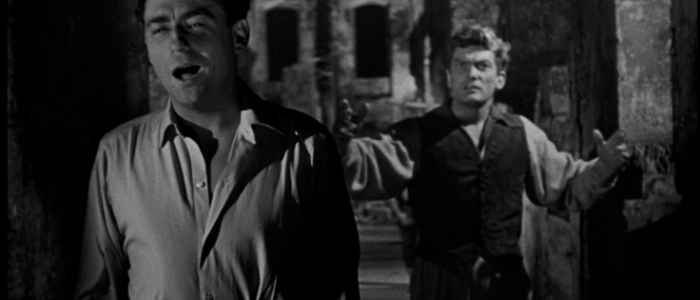
In the end, both Orpheus and Dante return to an elevated state, though Orpheus’s enlightenment could be argued as one of ignorance and not of enlightenment. Orpheus and Eurydice return to life after being in death, ignorant of all that has happened to them. He embraces his wife, when once he gave her only indifference. Orpheus’s loss of memory after his encounter with death quite possibly is Cocteau’s own rejection of the poet getting so close to death, for while the poet is pursuing death, they forgo the joys of life.
By creating an ending where life is restored, Cocteau is reminding the viewer of the importance of remaining connected to reality. Nevertheless, it can certainly be said that Orpheus and Dante have achieved immortality through their works, and may already be in our minds as mythological form.
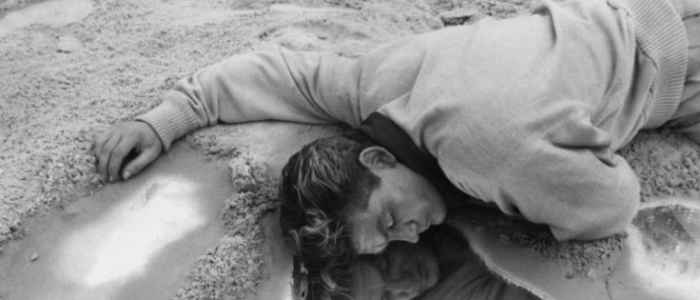
Works Cited
Alighieri, Dante. The Divine Comedy of Dante Alighieri: Inferno. Trans. Allen Mandelbaum. New York: Bantam Dell, 1980.
Desilets, Sean. “Cocteau’s Female Orpheus.” Literature Film Quarterly. 40.4 (2012): 288-300. EBSCO. Web. 5 Dec. 2015.
Hatcher, Elizabeth R. “Dante, Psychoanalysis, and the (Erotic) Meaning of Meaning.” Bulletin of the Menninger Clinic. 54.3 (1990): 353. EBSCO. Web. 5 Dec. 2015.
Kleinhenz, Christopher. “The Land of the Living and the Land of the Dead: Burial, Entombment, and Cemeteries in Dante’s ‘Divine Comedy’”. Religion & Literature. 31.1. (1999): 49-59. JSTOR. Web. 5 Dec. 2015.
GottfriedGeist. “Jean Cocteau, 1962.” YouTube. YouTube, 17 November 2007. Web. 5 December 2015.
Orphée. Dir. Jean Cocteau. SNC, 1950. Hulu. Web. 5 December, 2015.
Singleton, Charles S. “‘Dante’ in the Divine Comedy.” American Association of Teachers of Italian. 18.3 (1941): 109-116. JSTOR. Web. 5 Dec. 2o15.
Sheaffer-Jones, Caroline. “Fixing the Gaze: Jean Cocteau’s La Belle et La Bête.” Romanic Review. 93.3 (2002): 361-372. EBSCO. Web. 5 Dec. 2015.
Winegarten, Renee. “In Pursuit of Cocteau.” American Scholar. 58.3 (2002): 436-443. EBSCO. Web. 5 Dec. 2015.
What do you think? Leave a comment.











Emily, very powerful piece on poetry and death. Dante is one of my favorites and thank you for the introduction to Cocuteau/Orpheus, I was not aware of his works. I appreciate your research and the material you covered.
Thank you very much for your kind words. I am glad you enjoyed the read. 🙂
Cocteau was an existentialist for sure.
Beautiful poetry!
The divine comedy is a masterpiece, and has stood the test of time for a reason.
Indeed
One can talk for Eternity about the conscious or Unconscious influences upon Dante’s work.
True!
Striking pieces of film-making and writing.
“Orpheus” is pretty bizarre!
To be honest sometimes you want to hit Dante really hard in the face with his book, and then throw his unconscious corpse at Virgil for good measure.
I don’t agree, but every reader has their own interpretation.
The trouble with Dante is the same thing as Shakespeare, Spenser and Chaucer (in fact throw in the Greek writers too) you need a gear change to read them and they were writing in very different times.
I would not call it a trouble to read those works. I think a lot of what they write transcends time, and they communicate to the reader many universal themes such as love, art and beauty, etc.
I love epic poetry!
Dante and Cocteau were pure geniuses.
My first exposure to The Divine Comedy was through an old copy I bought at a used bookstore. It was filled with Gustave Dore’s engravings. I poured over it as though I had just discovered a wonderful treasure.
Yes the Gustave Dore illustrations are a wonderful companion to The Divine Comedy! I’m glad you enjoy it.
As a writer, Cocteau creates a grotesque universe that I love.
Wonderful article! I especially love the quote about Cocteau’s view of mythology and history. When I first watched ‘Orphée’, I had to watch it again because it was so rich in its imagery and surrealism. I definitely agree that both Dante and Orpheus have reached some kind of level of mythology.
Thank you very much. They are both beautiful and imaginative works of art.
Reading ‘The Divine Comedy’ once could never be enough.
It depends on your intentions.
Dante is the greatest poet, ever. And for that reason, the greatest philo-sopher (“lover of Wisdom”).
Very beautiful literature that is very deep and artistic.
A triumph of the imagination.
Or two…
There have been many many films with magical or fantastical themes made over the years but there are very few which truly ARE magical like Orphée.
Agreed!
Cocteau comes as close as any soundfilm director to the beauty of cinematography in silent films. “Orpheus” is a beautiful film.
Two excellent and imaginative work.
You know what’s REALLY surreal? Writing, in an age where cgi calls the shots, of a surrealist movie of sixty plus years ago and trying to see what seems today to be crude special effects as the poetic magic it must have seemed to its original audience.
But it is a timeless work.
Dante’s vision is immense and beautiful and simply profound. It is truly deserving of its status as a benchmark of Western literature.
Very true!